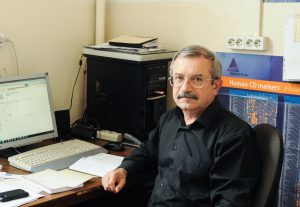
BELYAEV NIKOLAY NIKOLAYEVICH (he was born in 1953)
Doctor of Biological Sciences, Professor
Nikolay Nikolayevich Belyaev began his work at the Kazakh branch of the Institute of Nutrition of the USSR Academy of Sciences in 1976. A year later he continued his work in the Kazakh research institute of epidemiology, msicrobiology and infectious diseases of the Ministry of Health of the Kazakh SSR, where in 1982 he defended his thesis in “Allergology and immunology”. In 1985, Nikolay Belyaev became a member of the Institute of Molecular Biology and Biochemistry (IMBB), where he was invited by Murat Abenovich Aitkhozhin for organizing a new direction at the Institute – post-fusional technology for obtaining monoclonal antibodies, which N. Belyaev had been learning in the laboratory of immunology of the all-Union cardiological research Center (Moscow) on the initiative of Murat Abenovich Aitkhozhin. In 1986, after studying in Moscow, Nikolay Belyaev became the head of the immunology group, organized within the new laboratory of the Institute – the laboratory of genetic engineering, headed by Anatoly Borisovich Beklemishev. The result of scientific work of N. Belyaev’s group was a hybrid, secreting monoclonal antibodies to such important proteins for medicine, as staphylococcal alpha-toxin, staphylococcal enterotoxin A, human alpha-fetoprotein and human choriogonadotropin. Subsequently, on the basis of these antibodies, enzyme immunoassay diagnostic test systems were developed, and the intellectual potential of the work was realized in two PhD theses, which successfully defended by R.T. Tleulieva (1995) and S.A. Sinenko (1999) under the guidance of N.N. Belyaev and A.B. Beklemishev. From 1989 to 2010 on the initiative of N. Belyaev conducted studies of poorly studied at the time of natural immunosuppressive cells found in the bone marrow, the result of these works were two master’s theses on the mechanisms of influence on natural suppressor cells of histamine and alpha-fetoprotein, made G.K. Zakiryanova (1993) and A.Yu. Bogdanov (2005).
In 1994, Nikolay Belyaev defended his doctoral thesis on “the Study of the mechanisms of histamine participation in immunopathology and immunoregulation” in the specialty “Allergology and immunology”, and in 1997 he was awarded the title of Professor in the “Biology” specialty. After defending his doctoral thesis N. Belyaev worked as Director Deputy for science and management of IMBB (1995-2000). Pursuing administrative work, he simultaneously developed a new scientific direction for Kazakhstan – molecular and cellular immunology and immunobiotechnology, first as the Head of the Molecular immunology and immunobiotechnology group (1996), and then as the Head of the independent Molecular immunology and immunobiotechnology laboratory (1997).
From 2005 to 2011 the Laboratory of Molecular immunology and immunobiotechnology under the guidance of Nikolay Belyaev studied the biology of hematopoietic stem cells (HSCs), including their clinical, diagnostic and therapeutic significance, as well as the development of new biotechnological approaches to their production from peripheral blood and reproduction in vitro. Together with the staff of the A.N. Syzganov Scientific center of surgery Ministry of Health of the Republic of Kazakhstan and the Institute of cardiology and internal diseases Ministry of Health of the RK, Nikolay Belyaev organized three research areas of hematopoietic stem cells (HSCs) within the framework of three governmental Programs (2006-2008). The results of these studies were presented at several international conferences and symposiums (England, France, Japan, Germany, USA, Russia, Kazakhstan), were published in Kazakhstani and foreign scientific journals and three monographs A series of studies of hematopoietic stem cells (HSCs) have ended with the candidate (T.M. Bogdanova – 2010) and doctoral (A.Yu. Bogdanov – 2010) defenses, revealing the molecular mechanisms of regulation of HSC activity by alpha-fetoprotein.
By 2012, based on previous researches Nikolay Belyaev with a team of laboratory staff developed a new scientific direction related to the study of immunosuppressive cells, including myeloid suppressor cells (MDSC), T-regulatory cells (Treg) and NK-regulatory cells (NKreg), involved in the pathogenesis of cancer and autoimmune diseases. The final stage of N. Belyaev’s activity in the Laboratory of molecular immunology and immunobiotechnology is characterized by high publication activity of the team’s members. In the period from 2012 to 2019 fifteen articles were published in English in peer-reviewed international journals indexed by Web of Science and Scopus and two chapters in two monographs published in the United States. Under the guidance of Nikolay Belyaev there were prepared and defended PhD thesises of Julia Perfileva (2012) (tutorial in collaboration with G.K. Zakiryanova) and Ekaterina Ostapchuk (2016), which were devoted to the study of NK cells and Treg – and NKreg-cells in breast cancer.
Over the period of immunological direction existence of the Institute which was founded by N. Belyaev, there were published more than 250 scientific publications, has obtained seven (7) provisional patents and patents of RK. Under Nikolay Belyaev supervision there were completed and defended 7 Candidate theses, 1 PhD thesis. He was a scientific consultant at 3 doctoral theses. Nikolay Belyaev is the author and co-author of about 300 publications, including 5 monographs and 9 inventions. In 2005 he was awarded the medal of the President of Kazakhstan “25 years of Independence of Kazakhstan”.
 Каз
Каз Рус
Рус Eng
Eng